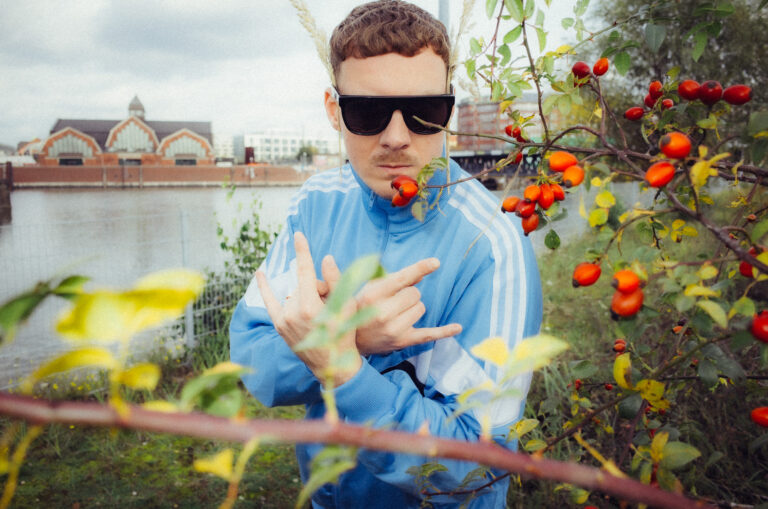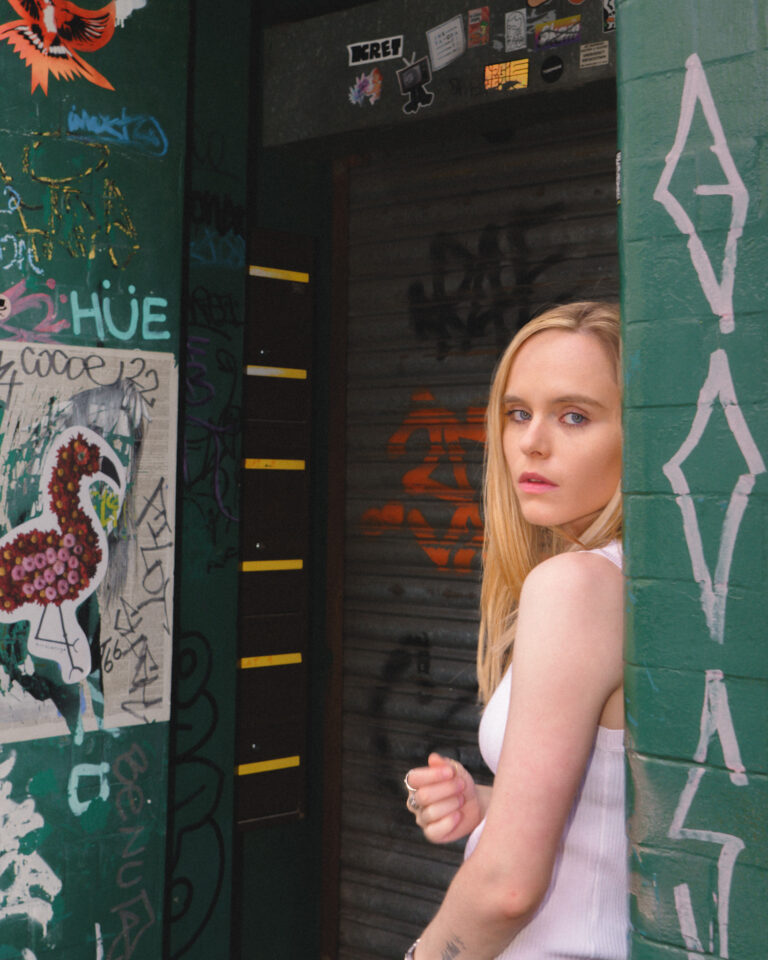Let us introduce you to MEL. We know her for her heavy instrumental tracks, so bassheads who are into neurofunk will have heard of this up-and-coming DJ before, but lately she’s been trying out some new stuff. She recently released her track ‘After All’ on UKF, a collab with vocalist Gid Sedgwick. This was a first for MEL as she had only made instrumental tracks before. Having smashed that track, and it doing really well, we’re sure there’s going to be more to come from her on that side.
At the beginning of November she’ll share a line-up with Black Sun Empire, Matrix, Killbox, and other legends in the genre, so we’re sure she’s preparing something very special for that one. We called MEL and talked all about meeting her legends, overcoming imposter syndrome, and how she’s building her drum & bass dream.
Congratulations on your track with Gid Sedgwick!
Yes, thanks! It was a really interesting experience to work with a vocalist for the first time. My first couple of tracks have only been instrumental, and heavy neurocentric. A lot of people have been asking me to do a vocal track lately, so I decided why not, to try out something different. One of my friends, Raiser, told me to work with Gid, and when I listened to his tracks I really liked that he had a rocky edge to his voice because I’m also into my rock and metal. We collaborated very well, and it was exciting because it’s just something different from me. I’m really happy to have that one out and I think UKF is the perfect home for it.
How was working with a vocalist different from your usual instrumental tracks?
It was more or less the same creative process for me, I think the only thing that made it different was incorporating the lyrics. The track has been really well received, so I’m happy about that. I was kinda thinking like “Will people like this track because people know me from doing harder styles,” but no everyone is really positive about it.
That’s not the only exciting thing happening for you, as you’ve got Virus Recordings Pt 2 coming up on the 3rd of November. How does it feel to be a part of such a massive line-up?
I’m so flattered to be on the same line-up as those legends. It came about when I was DJ’ing at Boomtown and I didn’t know it at the time, but Ed Rush and Optical were watching my set! Luckily I did a good set, and they came to talk to me afterwards and said “We need to book you,” and ofcourse I said yes. I can’t believe the event has come around so quick but I’m so excited. I’m a little bit nervous as well, just because there are so many legends there, but I’m ready to smash it. I’m going to prepare something special. Normally I like weaving different subgenres of drum & bass in my set, all while still keeping it heavy and high energy, but this one is going to a 100% neurofunk set. I’m planning to play a lot of facemelters and just have a great time.
That’s what we know you for! Why the passion for this subgenre?
I think I have always gravitated towards heavier music. I was into rock and metal before, and was into drum & bass when I was a teenager, and I feel like neurofunk is probably on the heavier side of the spectrum. Maybe there’s a connection there?
My love for drum & bass actually goes all the way back to 2008, and the cross-over axe would be Chase & Status and Pendulum for me, like for a lot of people probably. I remember that summer, we were listening to Hold Your Colour, the Pendulum album, and More Than A Lot by Chase & Status. They were on repeat, and it just went from there. I started digging deeper and that’s how I discovered neurofunk.
When did your journey as a DJ/ producer start?
I started DJ’ing back in 2011, and actually started DJ’ing rock and metal first in Camden. Gradually I got more and more into drum & bass, and started producing about 5 years ago now. I waited a bit longer with that because I was always worried about not being good enough. But eventually I managed to put the imposter syndrome aside and just get into it. I haven’t looked back since then.
What made you overcome that imposter syndrome?
I think I had all these ideas that I wanted to come to life, and I had so many plans, but I never really started. Then I thought “What am I so worried about? Why do I care so much about what other people think?”. You’ve got to be bad at something first to get good at something eventually, so I just took the plunge. Fortunately I have a few producer friends that really supported me and showed me the ropes, in the very early stages that also helped me a lot, which I’m super grateful for.
To anyone who’s in the same boat as I was before and doesn’t know how to get started, I would say to just believe in yourself. You have to believe in your ideas and make sure you’ve got a good support network of musicians and other artists around you. Really push yourself and ignore anything negative.
That’s some really good advice! So, another gig you’ve got coming up is one with Neuroheadz and Enei on the 25th of November in Reading. What can we expect from this one?
I really like Neuroheadz, they’re a grassroots label, and I think they’ve got big things coming for them. I think they just booked Ed Rush and Optical and Audio, and Black Sun Empire for their festival next year, which is absolutely massive. I think from me for this gig, it will be kind of a Virus pt2 but in a field instead!
There’s also something to be said about how they incorporate live instruments in their sets. It’s something different that not a lot of people are doing at the moment. When I DJ’ed for their event in Bristol they had a live drummer and a live guitarist with them. It’s really cool to see, because like I said earlier I was into rock and metal. I love how those two can come together, it’s really cool. I’m looking forward to seeing it again in November.
Would you ever consider incorporating live instruments in your sets?
Yeah maybe, that’s actually something to consider. But yeah it definitely might be something in the cards for later, a couple of years down the line.
https://soundcloud.com/meldnb/sets/data-transmission-shows
The next thing I want to talk about with you is your radioshows. You’ve got one on Kool FM, and one on Data Transmission.
Yes. I’ve been on Data Transmission for about 5 years now, maybe even 6. I always try to make that show a bit different because you’ve got your fans listening and you don’t want to bring the same old sets every time. I usually bring a guest on and let them do a mix. On Kool FM I’m in the mix and bring all kinds of sounds.
I started getting into radio quite early on in my drum & bass journey. When I first got into the genre I came across Data Transmission, and to me it was an opportunity to get better at mixing, get more tune knowledge, and get my name out there and connect with other artists. It was a no-brainer for me to start doing, and now I got to the point where I really enjoy doing it and look forward to get back to every month. I think I’m Data Transmission’s longest running resident at the moment, so I’ll take that.
What are the main differences between radio and liveshows?
The main difference with my liveshows is, during my liveshows I always go hard because I want to connect with the crowd and make them
dance. During my radioshows I play a lot more subgenres like liquid and minimal for example, because I want to bring different sounds and a different vibe.
Obviously live, you’ve got the crowd and you’ve got the energy. It just feels like a big party, and it is, when you’re doing a show. Radio is a bit more chilled, go with the flow. They both got their good sides. I would say live is a bit more chaotic than radio where you’re just chilling by yourself. There’s more preparation with radio, because when something goes wrong it stays on the air forever, people can listen back to that. If something goes wrong live you just land back on your feet.
It also takes some courage to get back on your feet when something goes wrong live, no? How did you build that confidence over the years?
I think when I first started playing out live, when I made mistakes I’d beat myself up so much and think about it so much. But a lot of the time people don’t even notice your little slip up. Even if it’s a bigger mistake, no one really cares, it’s live, no one is going to have a 1000% perfect set every time. You just got to take the opportunity and get more practice with every set you do, and that’s how you’ll build your confidence.
What’s next for you?
I’m ready to get back into studio hibernation now that I’ve got all my tracks out for the year. So for now, it’s just back into the studio to make more tunes and prepare for next year.
FOLLOW MEL: Soundcloud/Instagram/Linktree


